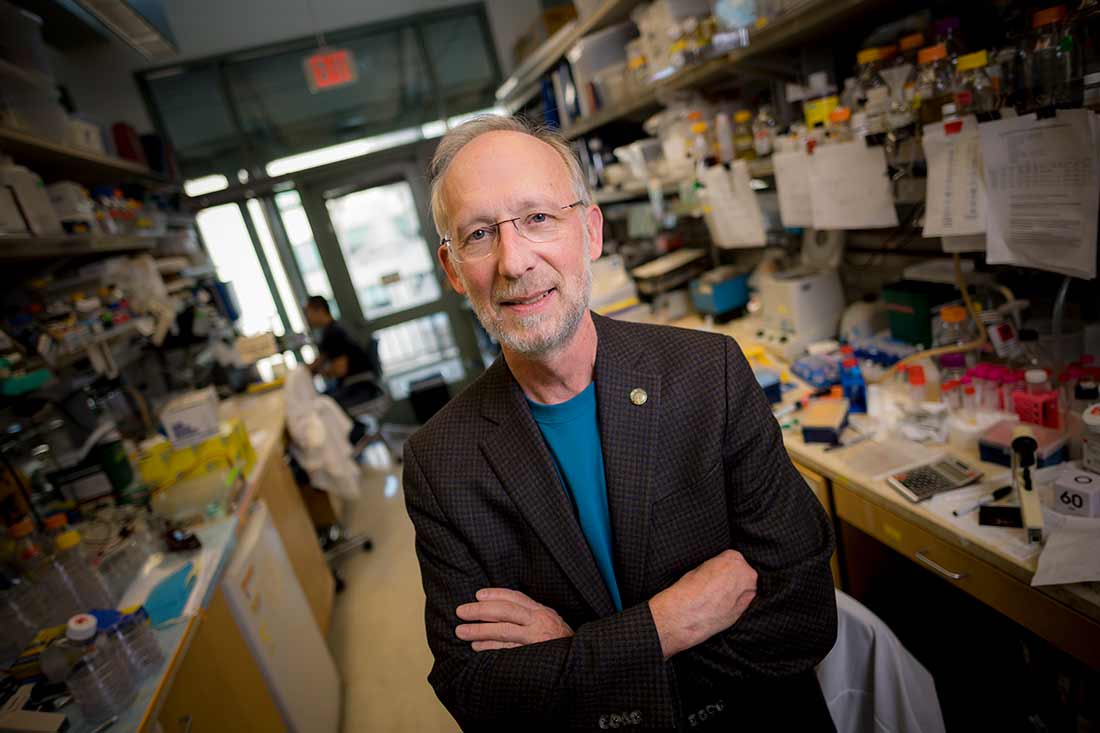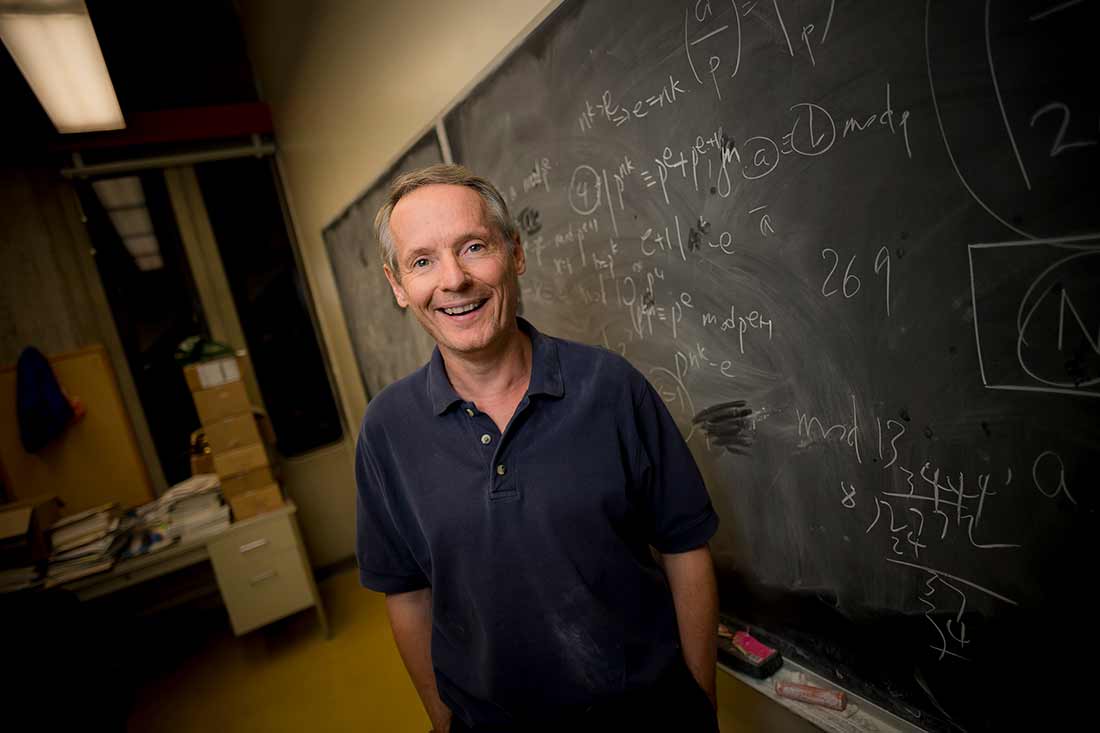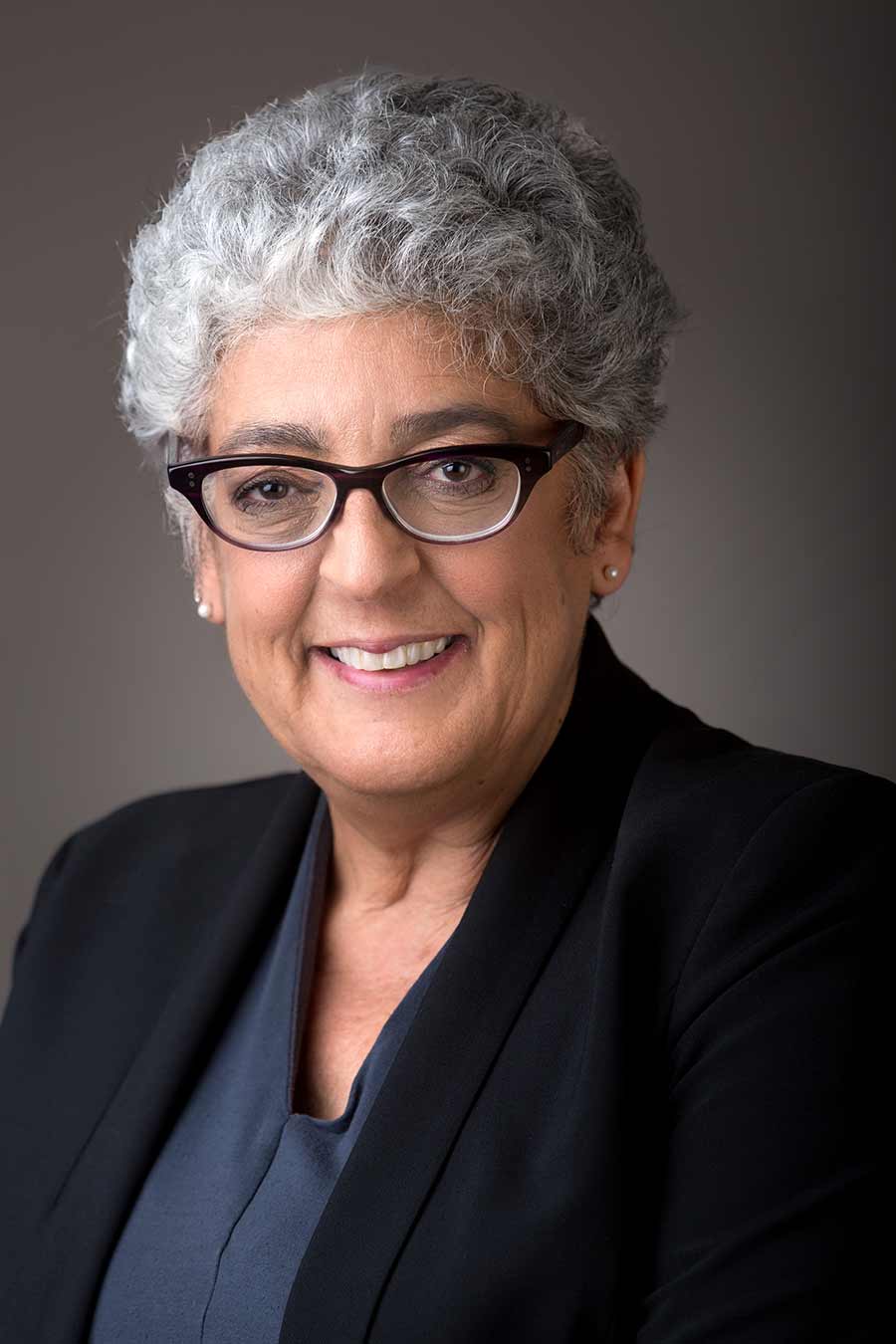By:
- Scott LaFee
Published Date
By:
- Scott LaFee
Share This:
Top UC San Diego Researchers Win ‘Oscars of Science’
Each will receive $3 million award as recipient of Breakthrough Prize
Don Cleveland spends much of his time ruminating on the faulty molecular mechanisms that drive diseases like amyotrophic lateral sclerosis (ALS or Lou Gehrig’s disease) and Huntington’s. James McKernan explores the world of birational geometry. Joanne Chory digs into the secrets of plant life.
Each is doing important work, perhaps even life- or world-changing work. But glamorous? Well, maybe not so much.
Last Sunday, however, was a different story. In a televised ceremony, replete with red carpet and movie stars, Cleveland, distinguished professor of cellular and molecular medicine, neurosciences and medicine at UC San Diego School of Medicine, McKernan, professor of mathematics at UC San Diego, and Chory, a plant biologist at Salk Institute and an adjunct professor in the Division of Biological Sciences at UC San Diego, were honored as recipients of the 2018 Breakthrough Prize in life sciences or mathematics.
The prize is among science’s richest: Each comes with a trophy and a no-strings cash award of $3 million. By comparison, Nobel Prizes are worth approximately $1 million, which is shared if there are multiple laureates in a category.
First awarded in 2012, the Breakthrough Prize is the collaborative creation of Mark Zuckerberg, founder of Facebook, and his wife, Priscilla Chan; Sergey Brin, co-founder of Google and his wife, Anne Wojcicki, founder of the genetics company 23andMe; and Yuri Milner, a Russian businessman and philanthropist. It celebrates scientists who ask big questions that inspire and improve lives, with awards in three categories: fundamental physics, life sciences and mathematics.
The prize—this year there were seven $3 million prizes—are intended to highlight scientists who are tackling the biggest questions and toughest challenges. “The world needs their inspiration,” said Zuckerberg, “and they are a reminder that even though it doesn’t always feel that way, we are making steady progress toward building a better future for everyone.”
Past recipients have included Alan Guth, the inventor of inflationary cosmology, and Jennifer Doudna, co-discoverer of the CRISPR-Cas9 genome editing system.
“We are so proud of our faculty—professors Don Cleveland, James McKernan and Joanne Chory—for receiving the prestigious 2018 Breakthrough Prize,” said Chancellor Pradeep K. Khosla. “These awards garner global attention for their innovative work in medicine, mathematics and biology, and underscore UC San Diego’s penchant for pushing the boundaries of knowledge and challenging expectations.
“Our exceptional scholars take risks, redefine conventional wisdom, and transform lives of people around the world through their groundbreaking research and discoveries.”
A closer look at the winners:

Don Cleveland
Cleveland, who is also chair of the Department of Cellular and Molecular Medicine at the School of Medicine and a member of the Ludwig Institute for Cancer Research, San Diego, was honored for his work “elucidating the molecular pathogenesis of a type of inherited ALS, including the role of glia in neurodegeneration, and for establishing antisense oligonucleotide therapy in animal models of ALS and Huntington’s disease.”
He has made seminal contributions to the understanding of how brain cells grow during normal mammalian development and how defects in those mechanisms lead to inherited neurodegenerative diseases such as ALS and Huntington’s. Breaking with the mainstream belief in the field, Cleveland discovered that the genetic mutations that cause these diseases affect not just neurons, but the entire neighborhood of brain cells. He was the first to purify tau, the protein that mis-assembles and accumulates in Alzheimer’s disease and chronic brain injury, where it correlates with cognitive decline.
Based on these fundamental findings, Cleveland and his colleagues developed a ground-breaking approach to treating neurodegenerative diseases: designer DNA drugs that reduce synthesis of the toxic proteins produced by gene mutations or increase production from poorly expressed genes. This technology has already proven successful—it’s the underlying principle behind Ionis Pharmaceutical’s FDA-approved therapeutic for spinal muscular atrophy, an inherited muscle wasting condition that was previously always fatal. Now, kids who were completely immobilized are walking. Similar designer DNA drugs are currently in clinical trials for the treatment of ALS, Huntington’s disease and Alzheimer’s disease.
“Don’s work defines the essential nature and need for basic science,” said Dr. David Brenner, Vice Chancellor of Health sciences and Dean of the School of Medicine. “Before there can be new therapies or treatments, we must first understand the fundamentals, the mechanisms of cells and the pathologies of disease. Don began by studying basic neural cell biology, then translated his work into understanding neurological diseases which has directly led to clinical trials.”
“This is stunning,” said Cleveland. “It’s a big honor, and it’s a lot of money. My wife and I are going to establish a charitable fund to support causes that we feel strongly about."

James McKernan
McKernan, who is also the Charles Lee Powell Endowed Chair in Mathematics II, was honored “for transformational contributions to birational algebraic geometry, especially to the minimal model program in all dimensions.”
Birational geometry is a field of algebraic geometry that aims to make determinations about algebraic varieties—the set of solutions of a system of polynomial equations over the real or complex numbers. McKernan’s work has been recognized by professional organizations, and he has won several awards, including the Clay Research Award and the Cole Prize in Algebra. He is also a Simons Investigator.
McKernan is also a longtime, active educator who values diversity. He has taught a graph theory course to many underrepresented students. He also directs an American Mathematical Society summer school program to encourage underrepresented students near graduation and recent Ph.D. graduates to collaborate. He teaches both undergraduate and graduate courses in mathematics at UC San Diego.
“This is an exceptional and well-deserved honor for James,” said Steven Boggs, dean of the Division of Physical Sciences. “As one of the world's leaders and most innovative thinkers in algebraic geometry, we are fortunate to count him among our Department of Mathematics’ faculty and our colleagues within the division.”
Lei Ni, professor and chair of mathematics, said that McKernan serves on the department council and other key committees. “Besides his important scientific contributions, he is helping to shape the future of the mathematics department at UC San Diego,” he added.
McKernan said that he is both honored and humbled to receive the Breakthrough Prize with Christopher Hacon, distinguished professor of mathematics at the University of Utah.
“We hope that it will inspire others to pursue research in mathematics,” said McKernan. “We would also like to share our deep gratitude to our mentors, colleagues and co-authors. Without their mathematical contributions and support, we would never have been able to be part of these beautiful discoveries, which are really just the finishing touch on a decades’ long research program advanced by the vision and efforts of many brilliant mathematicians. Sharing this progress with them has been exhilarating.”
Joanne Chory

Chory, who also directs the Plant Molecular and Cellular Biology Laboratory at Salk Institute and is a Howard Hughes Medical Institute investigator, was honored in life sciences “for discovering how plants optimize their growth, development, and cellular structure to transform sunlight into chemical energy.”
She has spent more than 25 years deciphering the mechanisms that allow plants to achieve flexibility in form, pioneering the use of molecular genetics to study how plants respond to their environments and producing major discoveries surrounding how plants sense light and make growth hormones. More recently, her research has also focused on turning this hard-won knowledge of plant biology into practical solutions for tackling global warming.
“Joanne has had a tremendous impact on the field of plant biology,” said Mark Estelle, professor and chair of the Section of Cell and Developmental Biology in the Division of Biological Sciences. “Her fundamental contributions to our understanding of plant growth are unparalleled. Equally important, Joanne has been an exceptional mentor and colleague to hundreds of scientists around the world.”
Still, winning was a surprise, Chory told the San Diego Union-Tribune. “I was pretty shocked because this prize has been more associated with biomedical things,” she said. “For a while, I just sat in my office quietly. Finally I called my husband and he sat in his office quietly. And then we went back to work.”
The Breakthrough Prize is intended to be inspirational, aspirational—and high profile. They’ve been called “the Oscars of science.” Sunday’s awards ceremony at the NASA Ames Research Center in Silicon Valley was broadcast live on the National Geographic channel, hosted by actor Morgan Freeman, with performances by hip hop artist Wiz Khalifa and Taiwanese actress-musician Nana Ou-Yang and presenters ranging from five-time Olympic gold medalist swimmer Katie Ladecky to celebrities Mila Kunis and Ashton Kutcher.
Seven $3 million prizes were awarded, plus an additional $1 million in smaller awards to early career researchers, mathematicians and students. Since its inception, nearly $200 million has been given out.
In 2012, Dr. Napoleone Ferrara, distinguished professor of pathology at UC San Diego School of Medicine, was named one of original Breakthrough Prize laureates for identifying the role of the human VEGF gene in promoting angiogenesis—the formation of new blood vessels that can feed tumor growth—and subsequent development of two major monoclonal antibody drugs: Bevacizumab (marketed as Avastin), which is used to treat multiple forms of cancer, including breast, brain and colorectal, and ranibizumab (marketed as Lucentis), which treats wet age-related macular degeneration, a leading cause of blindness in the elderly.
For more information on the Breakthrough Prize and a full list of this year’s winners, visit https://breakthroughprize.org.
Share This:
Stay in the Know
Keep up with all the latest from UC San Diego. Subscribe to the newsletter today.



